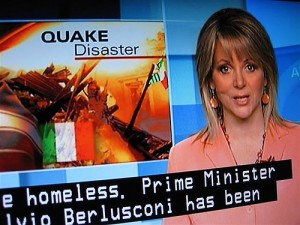Italian Seismologists Charged with Manslaughter for Not Predicting Earthquake
 Photo: RubyGoes
Photo: RubyGoesIn our latest Freakonomics Radio podcast, “The Folly of Prediction,” we talk about the incentive structure behind making predictions. Wrong predictions almost always go unpunished, which is why people make so many of them. (You can download/subscribe at iTunes, get the RSS feed, or read the transcript here.)
But recent news out of Italy seems to take the premise of punishing bad predictions a bit too far. From the New York Times:
Seven Italian seismologists and scientists went on trial on manslaughter charges on Tuesday, accused of not adequately warning residents of a central Italian region before an earthquake that killed 309 people in April 2009. Prosecutors say that the seven defendants, members of a national panel that assesses major risks, played down the risk of a major earthquake’s occurring even though there had been significant seismic activity near L’Aquila, the capital of the Abruzzo region, in the months before the quake. The case has drawn the attention of the international scientific community, which argues that it is impossible to predict an earthquake. Prosecutors, in actuality, charge that the panel did not fulfill its mandate and instead conveyed “incomplete, imprecise and contradictory information.”
In an op-ed for NewScientist, Thomas H. Jordan, director of the Southern California Earthquake Center, breaks down the dilemma the seismologists faced in trying to make a judgment call.
Did the scientists do anything wrong? The facts of the case are complex. Seismic activity in the L’Aquila area increased in January 2009, prompting school evacuations and other preparedness measures. Media coverage was inflamed by a series of earthquake predictions issued by Gioacchino Giuliani, a local man who worked as technician in a physics laboratory. These predictions had no official validity but were widely reported. At least two of the predictions were false alarms. No evidence indicates that Giuliani transmitted to the public or any civil authority a valid prediction of the main shock.
The Italian scientists were trapped by a simple yes-or-no question: “Will we be hit by a damaging earthquake?” This was not surprising given Giuliani’s alarms, but it was not one they could answer conclusively. From what they knew a week before the earthquake, a big shock was not very likely: the probability of a false alarm (if an alarm were raised) exceeded the probability of a failure-to-predict (if an alarm were not cast) by a factor of more than 100. Even so, seismic activity had increased the probability of a large earthquake by a significant factor, perhaps as much as 100-fold, above the long-term average.
Distracted by Giuliani’s predictions, the authorities did not emphasise this increase in hazard, nor did they focus on advising the people of L’Aquila about preparatory measures warranted by the seismic crisis. Instead, they made reassuring statements that were widely interpreted to be categorical.
(HT: Katherine Wells)

Comments